Living with a disability comes with challenges, but knowing your rights can make all the difference. In India, the government has introduced various laws and policies to ensure equal opportunities, accessibility, and dignity for people with disabilities. Whether you or someone you know is navigating life with a disability, understanding these rights can help you access the support, benefits, and protections available.
This guide will break down disability rights in India in simple terms, covering legal protections, employment opportunities, financial aid, education, and more. Let’s explore everything you need to know.
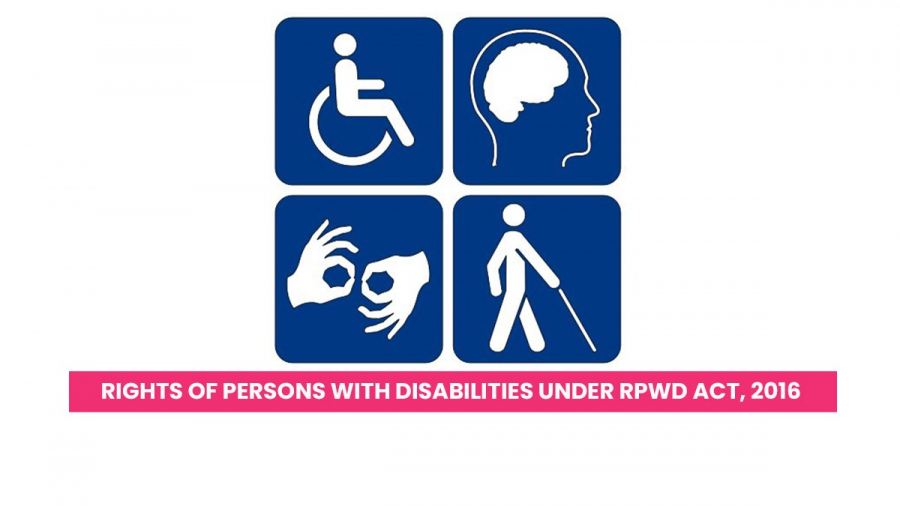
The Rights of Persons with Disabilities Act, 2016
The Rights of Persons with Disabilities Act (RPWD), 2016 is the most important law protecting people with disabilities in India.
It replaced the older Persons with Disabilities (PwD) Act of 1995, expanding the number of recognized disabilities from 7 to 21. This law ensures that people with disabilities have equal opportunities in education, employment, and daily life.
Some key highlights of the RPWD Act:
- Non-Discrimination: No one can deny a person with disabilities access to education, jobs, or public places.
- Accessibility: Buildings, transport, and digital platforms must be made accessible.
- Education Rights: Schools and colleges cannot refuse admission based on disability.
- Employment Protections: Companies with more than 20 employees must follow policies for hiring persons with disabilities.
- Reservations in Government Jobs: 4% of government jobs are reserved for persons with disabilities.
- Financial Support: The government offers various pensions, grants, and schemes for disabled individuals.
The Act empowers people with disabilities to demand their rights if they face discrimination.
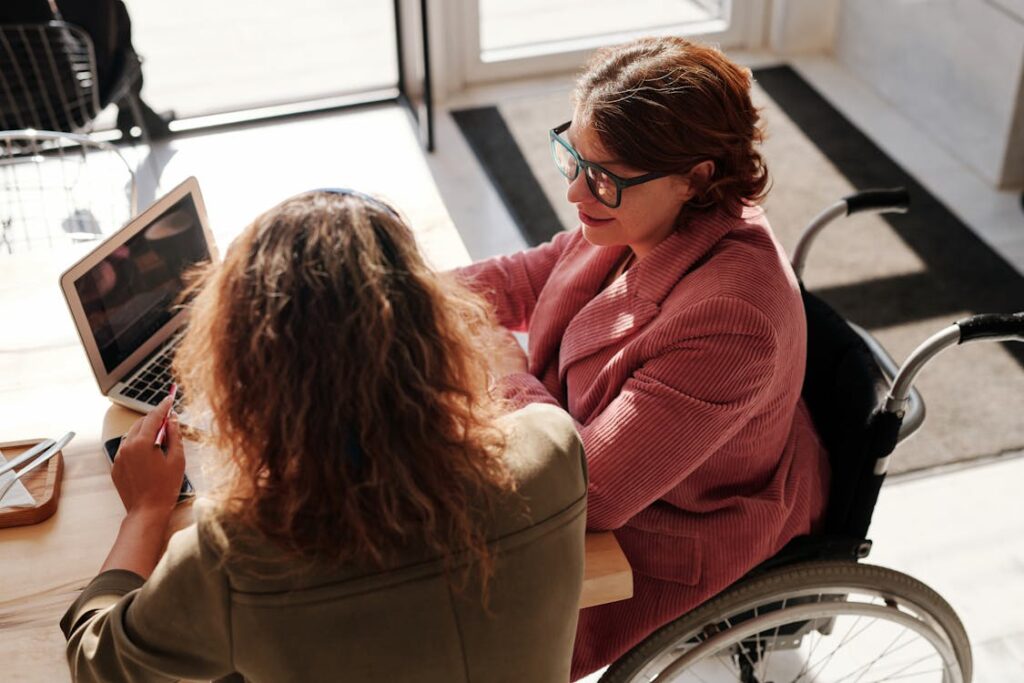
Reservation in Education and Employment
The Indian government has reserved seats in schools, colleges, and jobs to ensure fair opportunities for persons with disabilities.
Education
- All government and government-aided schools must provide inclusive education.
- Colleges and universities must reserve 5% of seats for students with disabilities.
- Financial aid and scholarships are available for higher education.
Employment
- The 4% job reservation in government jobs applies to public sector companies and departments.
- Private companies are encouraged to hire persons with disabilities and provide reasonable accommodations.
- Government schemes like Skill India and National Handicapped Finance and Development Corporation (NHFDC) offer skill training and self-employment support.
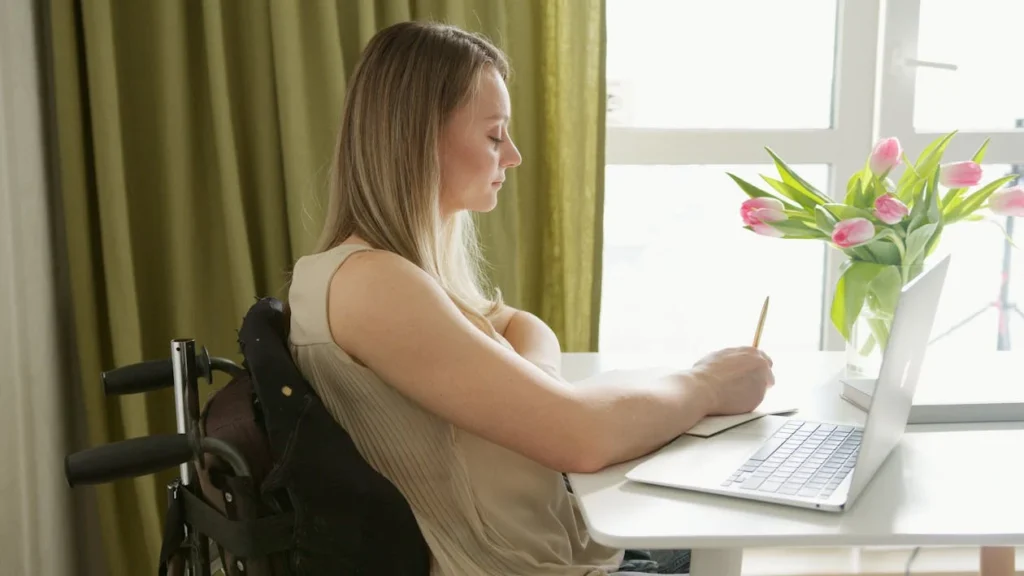
Accessibility: Making Public Spaces and Digital Platforms Inclusive
Accessibility is a major focus under Indian law. The RPWD Act makes it mandatory for public places, transport, and online services to be disability-friendly.
- Public Transport: Railways, buses, and metro stations must have ramps, lifts, and wheelchair-friendly seats.
- Government Buildings: Offices, courts, and hospitals must be accessible to all.
- Digital Accessibility: Websites and mobile apps must be user-friendly for people with visual, hearing, or mobility impairments.
Despite these rules, accessibility remains a challenge in many parts of India. If you face difficulties accessing public places, you have the right to file a complaint.

Legal Protections Against Discrimination
Discrimination against people with disabilities is illegal in India. The Rights of Persons with Disabilities (RPWD) Act, 2016, along with other laws, ensures that people with disabilities are treated fairly in all aspects of life.
This includes education, employment, healthcare, and public spaces. However, despite these legal protections, discrimination still happens. Knowing your rights can help you take action when necessary.
Protection in Education and Employment
One of the most common areas where discrimination occurs is in schools and workplaces. Many children with disabilities face challenges in getting admitted to schools, while adults with disabilities struggle to find jobs.
However, the law is clear—no educational institution can deny admission to a student based on disability. Schools and colleges must provide inclusive education, reasonable accommodations, and necessary support, such as special educators and assistive technology.
If an institution refuses admission or fails to provide these facilities, you can file a complaint with the State Commissioner for Persons with Disabilities.
In employment, discrimination can take many forms. Some employers may refuse to hire someone because of a disability, while others may offer lower salaries or inadequate support. The law protects employees by ensuring equal pay and opportunities.
Public sector jobs have a 4% reservation for persons with disabilities, and private companies are encouraged to adopt inclusive hiring policies.
If you experience workplace discrimination, you can file a complaint with the Equal Opportunity Policy committee within the company or escalate it to the concerned legal authorities.
Protection in Public Spaces and Services
Access to public spaces and services is a fundamental right for every citizen, including those with disabilities. Under Indian law, all public buildings, transport systems, and digital services must be accessible.
Yet, many places still lack ramps, elevators, and other essential accessibility features. If a government office, hospital, railway station, or any other public facility is not accessible, you can demand action.
Complaints can be filed with the concerned government department or the Disability Commissioner’s office in your state.
Private businesses, such as hotels, restaurants, and shopping malls, are also required to be accessible. If a business refuses entry or fails to accommodate your needs, you have the right to report them.
Legal Recourse for Disability Rights Violations
When discrimination happens, knowing where to turn for help is crucial. Every state in India has a State Commissioner for Persons with Disabilities, where complaints about discrimination, accessibility issues, or policy violations can be filed.
The National Human Rights Commission (NHRC) also takes up cases related to disability rights.
For workplace-related issues, employees can take their grievances to the Chief Commissioner for Persons with Disabilities or seek legal assistance through organizations working for disability rights.
If legal intervention is necessary, filing a petition in the High Court or Supreme Court of India is also an option. Many landmark cases have strengthened disability rights in India, showing that the legal system can be a powerful tool for justice.
Despite strong legal protections, enforcing these rights remains a challenge. Awareness, self-advocacy, and collective action are necessary to ensure that disability laws are not just written policies but are actively implemented.

Financial Assistance and Government Schemes for Persons with Disabilities
Living with a disability often comes with additional costs, such as medical expenses, assistive devices, and rehabilitation services. To support individuals with disabilities, the Indian government provides various financial assistance programs and schemes.
These benefits help improve the quality of life by making healthcare, education, employment, and entrepreneurship more accessible. Understanding these schemes can help you take full advantage of the resources available.
Disability Pension and Other Financial Support
The Indira Gandhi National Disability Pension Scheme (IGNDPS) provides monthly financial assistance to individuals with disabilities who belong to economically weaker sections.
This scheme is part of the National Social Assistance Programme (NSAP) and offers a monthly pension to eligible individuals aged 18 and above. Many states also have their own disability pension programs with different eligibility criteria and benefit amounts.
Apart from pensions, people with disabilities can receive financial support through scholarships for education, grants for self-employment, and concessions on loans.
The National Handicapped Finance and Development Corporation (NHFDC) offers loans at lower interest rates to help individuals with disabilities start businesses, pursue higher education, or purchase assistive devices.
Individuals with disabilities are also eligible for income tax exemptions under the Income Tax Act, Section 80U, and parents or guardians of disabled dependents can claim tax deductions under Section 80DD.
These tax benefits help ease the financial burden on families and caregivers.
Free or Subsidized Assistive Devices and Healthcare
Assistive devices such as prosthetic limbs, wheelchairs, hearing aids, and mobility aids play a crucial role in improving independence and mobility.
The Assistance to Disabled Persons for Purchase/Fitting of Aids and Appliances (ADIP) Scheme provides free or subsidized assistive devices to individuals with disabilities. This scheme is especially helpful for those who cannot afford high-quality prosthetics or mobility aids.
Government hospitals and select private hospitals offer free or discounted medical treatments, surgeries, and rehabilitation programs for persons with disabilities.
Many states provide free physiotherapy, occupational therapy, and other essential healthcare services to ensure that individuals can lead healthier lives.
Transport and Travel Benefits
Public transport can be a significant challenge for persons with disabilities, which is why the government offers travel concessions. Individuals with disabilities can avail of free or discounted bus and train travel through the Indian Railways and State Transport Corporations.
Railways provide up to 75% concession on train fares, while many state governments offer free or heavily discounted bus travel. Airlines also provide ticket discounts for passengers with disabilities.
To make travel easier, the Unique Disability ID (UDID) Card can be used to avail of these benefits across different states. This card acts as a nationwide identification for disability-related benefits and simplifies the application process for various government schemes.
Housing and Land Allocation Benefits
Owning a home can be difficult for people with disabilities due to financial constraints. To address this, the government reserves a portion of land, plots, and housing units under various urban and rural housing schemes.
Programs like Pradhan Mantri Awas Yojana (PMAY) prioritize housing for individuals with disabilities, offering financial assistance or subsidized loans to help them own a home. Many states also provide reserved land allotments at reduced prices.
Access to financial assistance and government schemes is crucial for improving the lives of persons with disabilities. However, many people are unaware of the benefits they are entitled to.
If you or someone you know has a disability, applying for these schemes can provide significant support in education, employment, healthcare, and daily living.
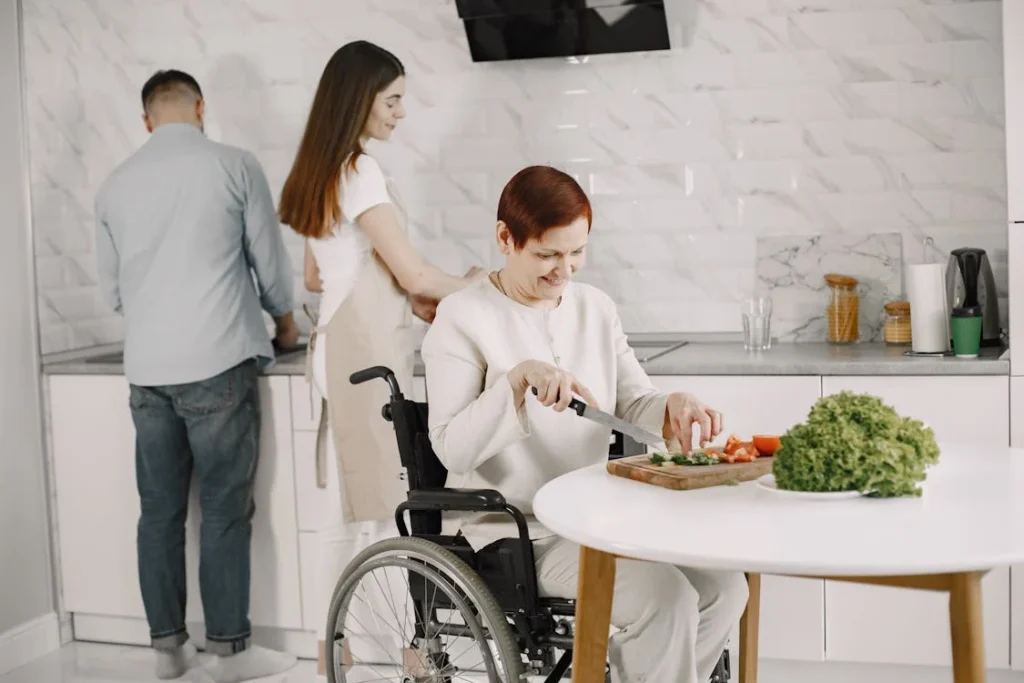
The Role of NGOs and Advocacy Groups in Disability Rights
While government policies and laws provide a strong foundation for disability rights in India, the role of non-governmental organizations (NGOs) and advocacy groups is just as important.
These organizations work on the ground to ensure that laws are implemented, awareness is spread, and individuals with disabilities receive the support they need. They also play a key role in fighting discrimination, promoting accessibility, and pushing for better policies.
Providing Essential Services and Rehabilitation
Many NGOs offer direct services to individuals with disabilities, including medical care, assistive devices, vocational training, and rehabilitation programs.
Rehabilitation is especially important for those who have acquired disabilities due to accidents, illnesses, or other medical conditions.
Organizations provide therapy, counseling, and skill development to help individuals regain their independence and improve their quality of life.
Some groups also run special schools and educational programs that cater to children with disabilities, ensuring they receive an inclusive and supportive learning environment.
For those who need prosthetic limbs or other mobility aids, NGOs work alongside companies like Robobionics to provide cost-effective, high-quality assistive devices.
Many organizations also conduct workshops and training sessions to help users adapt to their prosthetics and use them efficiently in their daily lives.
Advocating for Better Policies and Legal Reforms
One of the biggest challenges in disability rights is ensuring that laws are properly enforced. While the Rights of Persons with Disabilities Act, 2016, mandates accessibility, employment reservations, and anti-discrimination measures, many places in India still lack proper facilities for persons with disabilities.
NGOs and advocacy groups continuously push for better implementation of these laws. They work with the government to introduce policy changes, file legal petitions when rights are violated, and ensure that public and private institutions follow the guidelines set by the law.
Advocacy groups also organize campaigns to raise awareness about disability rights among the general public. Many people, including employers, educators, and even policymakers, are unaware of the legal protections available for persons with disabilities.
By educating society about these rights, NGOs help reduce stigma, promote inclusivity, and create a more supportive environment for individuals with disabilities.
Legal Aid and Support for Individuals Facing Discrimination
Despite strong legal protections, many people with disabilities still face discrimination in education, employment, housing, and public spaces. In such cases, legal support becomes crucial.
Several organizations provide free legal aid to individuals who need to fight for their rights. They assist with filing complaints, representing individuals in court, and ensuring that justice is served.
Legal advocacy also extends to issues such as workplace harassment, denial of services, and violations of accessibility laws.
When a public or private institution fails to provide reasonable accommodations, organizations take up cases on behalf of the affected individuals and demand corrective action. This legal backing gives people with disabilities the confidence to stand up for their rights and seek justice when needed.
Community Building and Support Networks
Living with a disability can often feel isolating, especially in areas where accessibility and inclusivity are limited. NGOs play a crucial role in building support networks for individuals with disabilities and their families.
They organize community events, peer support groups, and mentorship programs to create a sense of belonging.
Through these networks, individuals can connect with others who have similar experiences, share knowledge, and find emotional support.
Parents of children with disabilities also benefit from these communities, as they can access resources, guidance, and encouragement from other families going through similar challenges.
Encouraging Employment and Economic Independence
Financial independence is a major goal for many individuals with disabilities. NGOs help by providing vocational training, entrepreneurship programs, and job placement assistance.
They work with companies to promote inclusive hiring practices and create employment opportunities for persons with disabilities. Some organizations even offer microfinance programs that help individuals start their own businesses or self-employment ventures.
By focusing on skill development and economic empowerment, these groups enable persons with disabilities to lead independent and fulfilling lives.
They also challenge societal stereotypes that assume individuals with disabilities are dependent on others, proving that with the right support, they can contribute to the workforce just like anyone else.
The contributions of NGOs and advocacy groups are invaluable in ensuring that disability rights are upheld in India. While the government provides a legal framework, these organizations fill the gaps by offering direct support, raising awareness, and pushing for systemic change.
Their work continues to make a lasting impact on the lives of millions of individuals with disabilities across the country.

Challenges in Implementing Disability Rights in India
While India has strong laws and policies to protect the rights of persons with disabilities, the reality on the ground often tells a different story.
Many individuals still face barriers in education, employment, accessibility, and social inclusion. These challenges arise due to gaps in enforcement, lack of awareness, and deeply rooted societal attitudes.
Understanding these obstacles is crucial in addressing them and creating a more inclusive society.
Lack of Awareness and Education
One of the biggest challenges in implementing disability rights is the lack of awareness among both the general public and institutions responsible for enforcing these laws.
Many people with disabilities and their families are unaware of their legal rights, which prevents them from accessing the benefits and protections they are entitled to.
Employers, educators, and even government officials often do not fully understand disability laws, leading to unintentional discrimination or neglect.
Without proper awareness campaigns, schools may continue to deny admission to children with disabilities, workplaces may fail to accommodate employees with special needs, and public spaces may remain inaccessible.
Training programs for government employees, educators, and business owners are essential to bridge this knowledge gap and ensure that laws are followed in practice.
Poor Enforcement of Accessibility Standards
The Rights of Persons with Disabilities Act, 2016, mandates that public buildings, transport systems, and digital services be made accessible to persons with disabilities.
However, accessibility remains a major challenge in India. Many government offices, railway stations, and educational institutions still lack ramps, elevators, accessible washrooms, and other necessary facilities.
Public transport is another area where accessibility remains inadequate. While some metro systems and airports have made significant improvements, buses and trains in many cities and rural areas remain inaccessible to wheelchair users and those with mobility impairments.
Even when ramps or elevators exist, they are often poorly maintained or non-functional, making it difficult for people with disabilities to navigate public spaces independently.
Digital accessibility is also a growing concern. Many government websites, banking services, and online platforms are not designed to accommodate individuals with visual or hearing impairments.
This creates unnecessary barriers when accessing essential services such as applying for disability certificates, booking train tickets, or managing finances online. Stricter enforcement of accessibility guidelines and regular monitoring are necessary to improve these conditions.
Employment Barriers and Workplace Discrimination
Despite legal protections, unemployment remains a major issue for persons with disabilities in India. While government jobs have a 4% reservation for persons with disabilities, many positions remain unfilled due to bureaucratic delays or lack of proper recruitment policies.
In the private sector, inclusive hiring practices are still not widespread, and many employers hesitate to hire individuals with disabilities due to misconceptions about their capabilities.
Even when individuals with disabilities secure jobs, workplace accommodations are often inadequate. Many offices do not have accessible entrances, assistive technology, or flexible work arrangements that allow employees with disabilities to perform their tasks effectively.
Additionally, discrimination and bias in promotions and career growth further limit opportunities. Encouraging inclusive hiring practices, offering incentives to private employers, and ensuring better implementation of workplace accessibility standards can help address these issues.
Difficulties in Obtaining Disability Certification and Benefits
Accessing government benefits and disability-related services requires an official disability certificate. However, the process of obtaining this certification can be complex and time-consuming.
Many individuals face bureaucratic hurdles, multiple medical evaluations, and long waiting times, making it difficult to claim their rights. In rural areas, access to government offices and hospitals that issue disability certificates is even more challenging.
Even for those who manage to obtain a disability certificate, accessing financial assistance, pensions, and other government schemes is not always straightforward.
Corruption, inefficiency, and lack of coordination between different government departments can delay or prevent individuals from receiving the support they are entitled to.
Simplifying the application process, increasing awareness about available benefits, and using technology to streamline government services can improve access to essential support systems.
Stigma and Social Attitudes Towards Disability
Beyond legal and institutional challenges, one of the biggest barriers persons with disabilities face is societal stigma. Many people with disabilities continue to be seen as dependent or incapable, leading to social exclusion and discrimination.
In rural areas, traditional beliefs and cultural attitudes can further marginalize individuals with disabilities, limiting their access to education, employment, and even healthcare.
Families of children with disabilities often struggle with social acceptance and may face pressure to keep them hidden rather than allowing them to participate fully in society.
This mindset discourages independence and prevents individuals from pursuing opportunities that can improve their quality of life.
Public awareness campaigns, community programs, and representation of persons with disabilities in media and leadership roles can help challenge stereotypes and promote a more inclusive mindset.
The Way Forward: Bridging the Gap Between Law and Reality
Overcoming these challenges requires a combined effort from the government, private sector, civil society, and individuals. Stronger enforcement of disability rights laws, better awareness programs, and improved accessibility standards can make a significant difference.
Encouraging inclusive policies in education and employment, ensuring proper implementation of government schemes, and challenging societal stigma are key steps toward a more equitable future.
While there has been progress, much more needs to be done to turn legal protections into real-world benefits.
Persons with disabilities deserve the same opportunities, respect, and dignity as everyone else, and it is the responsibility of society as a whole to ensure that these rights are not just on paper but actively upheld in everyday life.
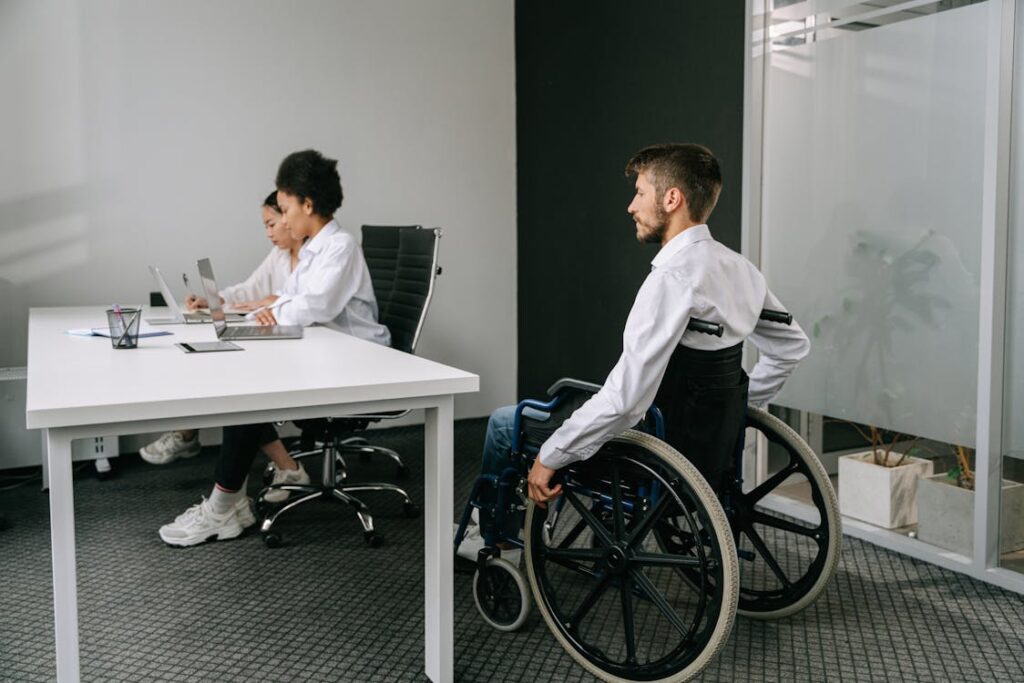
The Future of Disability Rights in India
India has made significant progress in protecting and promoting the rights of persons with disabilities, but there is still a long way to go.
As awareness grows and technology advances, the future holds promising possibilities for greater inclusivity, accessibility, and equal opportunities.
The next steps in strengthening disability rights in India will involve improving existing policies, leveraging innovation, and fostering a more inclusive society.
Strengthening Policy Implementation and Legal Reforms
While laws like the Rights of Persons with Disabilities Act, 2016, provide a strong legal framework, proper implementation remains a challenge.
Future reforms should focus on stricter enforcement mechanisms to ensure compliance with accessibility standards in public spaces, workplaces, and digital platforms.
Strengthening penalties for non-compliance and setting up independent monitoring bodies can help bridge the gap between policy and practice.
Another crucial aspect is simplifying bureaucratic processes. Obtaining disability certificates, accessing government benefits, and applying for reservations in education and employment should be made faster and more transparent.
Digitalizing these processes through a centralized online platform can reduce corruption and inefficiency, making it easier for individuals with disabilities to claim their rights.
Advancements in Assistive Technology and Inclusive Design
Technology has the power to transform the lives of persons with disabilities by enhancing mobility, communication, and independence.
Innovations in prosthetics, like the Grippy™ bionic hand by Robobionics, have already demonstrated how cutting-edge solutions can restore functionality and improve the quality of life for individuals with limb loss.
The future will see even more advancements in 3D-printed prosthetics, AI-powered mobility aids, and brain-computer interfaces, making assistive devices more affordable and efficient.
Smart cities and digital platforms must also prioritize inclusive design. Government and private sectors should invest in accessible smart infrastructure, such as voice-enabled ATMs, real-time navigation for wheelchair users, and AI-based speech recognition tools for individuals with speech or hearing impairments.
By integrating universal design principles in technology development, India can create a more inclusive digital and physical environment.
Expanding Employment Opportunities and Economic Inclusion
Employment is a critical factor in achieving social and financial independence for persons with disabilities. While public sector job reservations exist, private sector participation must increase.
Companies should be incentivized through tax benefits and grants to hire persons with disabilities, provide reasonable accommodations, and create a more inclusive work culture.
Entrepreneurship should also be encouraged through financial support and mentorship programs. Many individuals with disabilities have unique skills and talents that can be nurtured through self-employment and small business initiatives.
Government-backed microfinance schemes and training programs can help persons with disabilities build sustainable businesses and achieve financial independence.
Promoting Disability Representation in Leadership and Media
Representation matters in changing societal perceptions. The future of disability rights in India depends on having more individuals with disabilities in leadership roles—whether in government, corporate sectors, or media.
Policymakers, educators, and business leaders with disabilities can bring firsthand experience and insights into decision-making, leading to more effective and empathetic policies.
Media and entertainment also play a powerful role in shaping public attitudes. Increasing the representation of persons with disabilities in films, television, and advertisements can help break stereotypes and normalize disability as part of human diversity.
Disability-inclusive storytelling and advocacy through digital platforms can create a cultural shift towards acceptance and inclusion.
Building a More Inclusive Society
Beyond laws and technology, true progress lies in changing mindsets. Awareness campaigns, community programs, and educational initiatives must focus on dismantling the stigma associated with disability.
Schools should teach disability rights as part of their curriculum, promoting values of empathy, respect, and inclusion from an early age.
Public participation is equally important. Every individual, whether an employer, teacher, or neighbor, has a role to play in creating a society where persons with disabilities are treated with dignity and equality.
Small changes, such as offering assistance when needed, using inclusive language, and advocating for accessibility in local communities, can collectively drive a larger movement for change.
The Road Ahead
The journey toward full inclusion and equal rights for persons with disabilities in India is ongoing. While significant progress has been made, sustained efforts are needed to ensure that every individual, regardless of their abilities, can lead a dignified and independent life.
By strengthening legal enforcement, embracing technological advancements, expanding employment opportunities, and fostering a more inclusive mindset, India can pave the way for a future where disability rights are not just acknowledged but actively upheld in every aspect of life.
Conclusion
India has made significant strides in protecting the rights of persons with disabilities, but true inclusion goes beyond laws—it requires action at every level of society. While policies like the Rights of Persons with Disabilities Act, 2016, provide a strong foundation, real change will come through better implementation, increased awareness, and greater representation of persons with disabilities in education, employment, and leadership.
Technology and innovation will continue to shape the future, making assistive devices, accessible infrastructure, and inclusive digital platforms more widely available. At the same time, employers, educators, and the public must work towards eliminating stigma and creating equal opportunities for everyone.
For persons with disabilities and their families, knowing their rights is the first step toward empowerment. Advocacy, community support, and legal action can help ensure that these rights are upheld. The journey toward full inclusivity is ongoing, but with collective effort, India can become a country where every individual, regardless of ability, can live with dignity, independence, and equal opportunity.
If you or someone you know is looking for high-quality prosthetics, rehabilitation support, or assistive technology, Robobionics is here to help. Contact us today to explore our innovative solutions!




Great article! It really helped me understand the challenges of finding the right special needs daycare. Knowing there are resources like Companions specializing in special child care is fantastic, especially for parents looking for options near me.